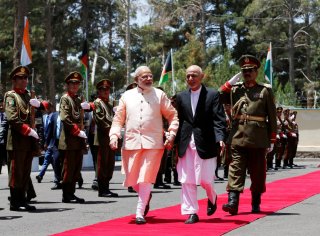How Biden’s Withdrawal Impacts India’s Stake in Afghanistan
With the imminent U.S. troop withdrawal and the Taliban’s territorial conquests, the Indian security establishment is preparing for a grim future for its stakes in Afghanistan and the impact on its internal security situation.
Finally, India’s problems are further exacerbated by the warming ties between the countries mentioned above. Regardless of their internal differences, all of these states, with their dictatorial values, rogue regimes, and revisionism rooted in ideological-cum-religious worldview, form an alternate and rival geopolitical block to what India, the United States, and other liberal democracies represent. Also, India’s reliance on the United States has its own limitations. The U.S. vulnerability to Pakistan in the Afghan peace process hardly needs any elaboration. In the future, if the U.S. military establishes a base in Pakistan, the talks of which are already underway, India’s options with the United States to pressure Pakistan will become further constrained.
Lastly, India has no formal communication channels with the Taliban. In the past, the Taliban assisted the Pakistani ISI in bomb attacks on Indian missions. The Indian intelligence brass always found it futile to engage the Taliban because of Pakistan’s overwhelming influence over the group. Also, giving it legitimacy would have raised questions about India giving formal recognition to Kashmir terror groups like Lakshar-e-Taiba and Jaish. However, on June 10, in a significant policy shift, India signaled its intent to talk to the Taliban directly, which appears to be an ad hoc and reactionary diplomatic move, lacking a long-term vision.
To sum up, India needs to think afresh and develop a new approach to understand and further its long-term geopolitical interests in Afghanistan. The issue merits a detailed discussion; however, to put it briefly, India can leverage its old ties with Russia, involve Israel, and pressure Pakistan in its turbulent underbelly of Sind and Baluchistan. Nevertheless, for now, the matrix of state and non-state actors obtained in Afghanistan after the U.S. withdrawal leaves India friendless, clueless, and hurriedly searching for a new strategy and friends.
Abhinav Pandya is a founder and CEO of Usanas Foundation, an India-based geopolitical and security affairs think-tank, and the author of Radicalization in India: An Exploration. His second book, Terror Financing in Kashmir will be released soon. He is an MPA from Cornell University, USA. His work has featured in Economic Times, Fair Observer (USA), Haaretz (Israel), South Asia Democratic Forum (Brussels), The Print, HW News, Sunday Guardian, Quint, Vivekananda International Foundation, Policy Perspectives Foundation, Perspectives on Terrorism, Huffington Post (USA), Express Tribune (Pakistan), Pak Tea House (Pakistan), First Post and Swarajya. He also appears as a panelist on India's national TV debates on security and strategic affairs. He tweets @abhinavpandya.
Image: Reuters.

